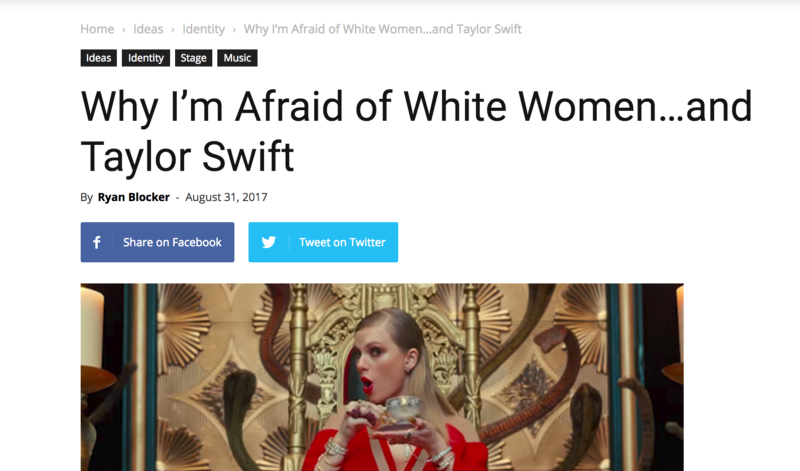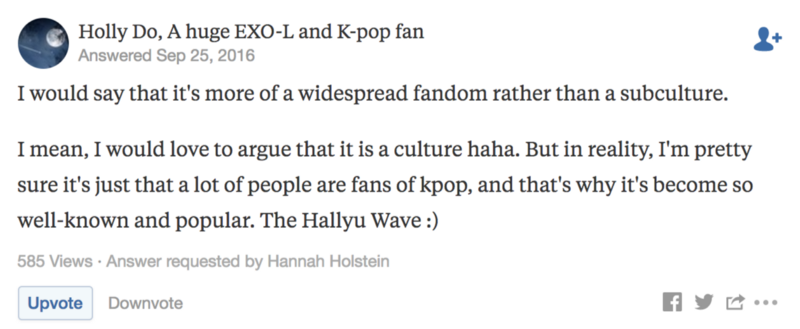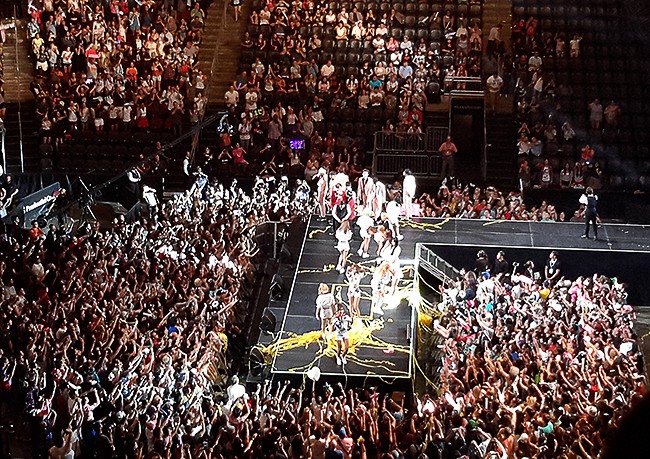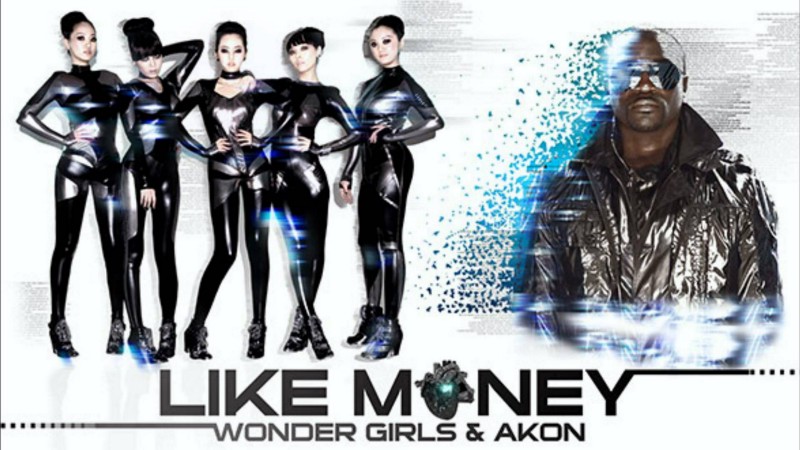Every so often over the past two decades K-pop makes its way back to the American consciousness and cues a spate of headlines like “A Record-Breaking Week Has Us Wondering: How Far Can K-pop Go?” (NPR), “K-pop group makes its mark on American culture” (The State-Journal Register), and “K-pop Boy Band BTS Learned English By Watching Friends and My Phalanges are Tingling” (Cosmopolitan) like it did a month ago when boy band BTS became the first Korean band to perform at the American Music Awards. Subsequently cue all the A.R.M.Y. members and ex-Blackjacks and EXO-Ls to wonder for the nth time in the K-pop history if Korean music will ever break through that stiff glistening ceiling, the ceiling through which Girls’ Generation didn’t break because there were too many of them; or Wonder Girls didn’t because they were called the Wonder Girls; or Psy didn’t because if anyone did have lasting potential in the American pop industry, it probably was not a middle-aged overweight Asian man.
The question that American fans took for granted was why each K-pop company so desperately wanted to enter the American industry in the first place — a desire once linked to subsidies the Korean government placed on certain entertainment initiatives instituted after the formal realization that soft culture imperialism resulted in tangible international consumption of Korean IT, clothes, food, and cosmetics — but probably had more to do with America’s cultural domination of the rest of the world, the self-perpetuated and externally-enforced belief that Americans had the fastest cars, glitziest lifestyles, and tightest music, tight as skin. The assertion in everyone’s mind, however, was the fact that numbers, chart-climbing, awards, TIMES titles, and music video views never resulted in actual cultural penetration, in that, it was never cool to bump “Gangnam Style” unless done ironically, slash the rest.

Any list, forum, or blogpost has credited audiovisual content, attention to detail, technicality, fashion, androgyny, for people’s attraction to K-pop. The politics associated, of course, are contentious. It is an even less guarded secret than Weinstein’s that the industry is rife with forced plastic surgery, sexual coercion, dictated diets, “slave” contracts, and crazy fans — as many former members who leave bands cite emotional trauma, lack of company support, contract rigidity, and ethnic discrimination from fellow bandmates. The industry is rife with monetary sponsors, whose relationships to idols often verge on sexual, though it would be unfair to claim this dynamic is specific to Korea and not generalizable to industry in general, including America’s.
Many aspects of the genre sit strangely in the context of American politics, where streetwear and rap is associated first and foremost with blackness. A recent article in Reappropriate conjectures that the documented anti-black ignorance of K-pop idols may be responsible for its inability to penetrate the American cultural conscious, though such accusations have never prevented white artists like Iggy Azalea or Taylor Swift from success in the past. There are no samples in K-pop. In the video for G-Dragon and T.O.P.’s “High High” the two men dance in a club full of white women. The genre regularly employs cosmetic procedures such as skin-lightening and eye-enlargement, which, though accepted in Korea, in the United States, would reek of secession to white standards of beauty (i.e. Julie Chen). English is co-opted as a regular prop, nonsensical and aesthetic. Life experience is crafted as trainees are selected to become stars at an ideal age of twelve years old. Groups are exogenously put together, and typically, no members play the guitar unless live music’s the group’s concept, a thinly-veiled term for marketing strategy. Though one should, in evaluating the Korean industry, be mindful that the experience of growing up in America cannot provide the tools necessary to understand the social context from which such situations arise, K-pop’s visual symbols are enough to serve as jarring violations of an American code of political decency. In sum, the K-pop industry seems to be America’s capitalistic nightmare, where life experience is appropriated, human rights are violated, and persona is concocted for one purpose — commodity.

In theory, such productive mechanisms of art in America is renounceable. Music seems inseparable from public life — we expect, as consumers, to know our artists’ ballots; to be able to read culturally into their words and videos; to have the option, at least, of modelling our thought after theirs. Here, silence is fuel for repudiation. Taylor Swift, a self-proclaimed feminist, was denounced by many social media and news outlets as op-eds pointed out her public lackof anger on Trump’s election. In America — where Bob Dylan is our most recent Nobel Prize winner in literature and albums like Kendrick Lamar’s To Pimp a Butterfly and Joey Badass’s All-Amerikkkan Bada$$ are rewarded for their socially-informed commentary — K-pop and its productive mechanisms do not fit the symbol of liberation, expression, vulnerability music takes on in society. So, music is also intertwined inextricably with our private lives. We ride out to radio, have first kisses to Legend, graduate to Green Day. But it is evident that the impersonality of K-pop does not, in practice, oppose American society because it is popular. Regardless of visibility, of political or ethical questionability, the numbers speak. And though the form may be popular, well, it just may not be popular with the right people.

Almost every non-Korean I know who loved K-pop at some point in the time we knew each other is over it now. But love meant love.
A subculture stands in parallel to mainstream society, distinctive enough to merit separation but similar enough that allegiance does not preclude connection to the mainstream. The debate of whether K-pop fandom reflects such a characterization continues. The Verge identified K-pop’s popularity in the United States as a subculture opposed to a “bona fide phenomenon,” prescribing similarly patronizing vocabulary to other aspects of the genre — stating the YouTube channel Eat Your Kimchi with more than one million subscribers was “apparently” popular, expressing discontent at the phrase “Culture Technology,” describing the genre itself as having an “obvious weirdness,” and concluding the cultural wave as existent in only the Internet with very little potential to go mainstream. Here, the reporter credits Gangnam Style’s mainstream appeal to Psy’s presence as antithetical to industry norms, his education at Berklee School of Music, and his time in the United States. Similar articles can be found in other mainstream sources, as reporters considered otherwise “dedicated to culture” go off on their own adventures to examine the genre, its fandom, and most importantly, its potential for widespread popularity.
From fans themselves, however, whether the K-pop fandom is simply a collective of disparate people with singular commonalities as opposed to a subculture is less defined. The question on Quora has four answers; the consensus, blurry. The answer, with no upvotes, that sticks with me after my traipse through the Internet is below, because it best exemplifies the idealism I held about K-pop when it was relevant to me:

And it had to be true. I believed it.
The first K-pop video I saw was Bigbang’s “Haru Haru” in the seventh-grade tech lab fifteen minutes before school started while my best friend at the time sanded the body of an electric car flat. We waited months for the car to work. We streamed videos continuously on my slow glitchy desktop at family friend house parties for New Year’s while kids matched names to faces. We learned steps to “Gee,” requested cult favorites at dances, short nights in the large, too-bright gym. We taped our eyelids, wore thick mascara, matched skirts with heels. We followed forums that instructed us to vote our favorite stars as z magazine’s artists of the year, Korean songs on the radio, performers in xmusic festival, openers for y American artist. We begged our parents for their credit cards, bought tickets to concerts at Prudential Center. By eighth grade I was determined to look like CL and marry G-Dragon and live a glamourous unfettered life in Korea. My father was less than thrilled by my plan. We didn’t go to America, he said, just for you to go back to Asia. I laughed and laughed. My mom landed a teaching job in Seoul that summer for a couple of weeks. She dragged her two stardom-aspiring daughters with her. My sister and I stayed in a dorm room while my mother stayed in a suite next door. I remember little about the trip besides barbeque, Katy Perry playing like clockwork twice an hour at the beauty shop across the street, and long car rides.
How — as the Quora comment above expresses in its insistence on normalcy — I wished I was a typical American tween, in commonality with so many others around me, with easily-understood quirks and ridges. By the time I got to high school, K-pop had turned sweet, saccharine. I didn’t understand the lyrics and couldn’t convince myself, as I did before, that this void didn’t matter. My favorite groups disbanded. I could no longer tell the differences between new groups. But I have met since members of the K-pop fandom, who, like me, never understood the lyrics, of all shapes sizes colors genders. And with each, even miles or years from my time with the genre, there does exist a kinship. We talk bands we loved and styles we wanted. We talk pretty faces and attitudes. We don’t talk politics, the manufactured perfection we consumed, the dirt beneath. We talk illusions — and even if we are too old to believe them, too collected for the movement — the minute we are allowed to indulge them, we do. For long moments, we wager we are not crafted enough to be disillusioned. For long moments, we wager that we were right.

One summer, my parents placed me in a camp at a nearby college to play chamber music. The camp was one week long, sleep-away. I craved the freedom but once I got there figured I was too cookie-cutter to make the luxury mean much. I was paranoid as hell. I didn’t go past prescribed campus boundaries or other people’s rooms post-curfew. Tight-lipped, I hung out alone, watched the other girls cling onto boys they took on as pets. The camp was whiter than one would expect. Place was no Meadowmount. The last day, I grew inseparable from this Filipino girl from a neighboring town, cousins with a kid from my high school. She had spent the majority of the week the way I did, lonely. We both played second violin. She loved anything SM Entertainment. I had been a YG fangirl. With semi-jingoistic undertones for the wrong side, we spent a lot of time talking about how the Korean industry produced better-looking, better-dancing, and better-singing artists than the American industry could ever. We wanted Koreans to snag the industry. We wanted to supplant, invade, and conquer. And we thought it was inevitable. Fandom was in some ways a life raft — we had an impenetrable language with each other, inaccessible by others in the camp. It kept us happy.
The moment reads now as an inferiority complex, close to white kids who loved Nirvana when Britney was popular. Were we disaffected? This narrative, in many strands of K-pop analysis and its global potential, goes unsaid, and though may be the implicit assumption of many articles exploring the topic, is hardly the thesis. For those who don’t understand Korean, K-pop becomes popular, even irrationally so, because it acts as a replacement. There is a selection bias involved. K-pop is not ubiquitous in American culture because only few people are looking for replacements. Therefore, the non-Korean people who K-pop attracts are misfits. We disliked both Britney and Nirvana. We were never the potential topics of love songs. We had no skin-tight jeans, bad breakups, forks or roads. And perhaps our attachment to the genre was the manifestation of a desperation to be seen. And what does it say about our home culture so dedicated to music as personal and political expression, that we believed we had larger chances of being seen in a medium based in language that was not our own than that based in language that was? That “we” didn’t mean me, an individual, but hundreds of thousands of people, enough for K-pop star Rain to take top spots in the TIME 100 poll for influential people in 2006, 2007, 2008, and 2011; for music videos to consistently rake in hundreds of millions of views; for EXO concerts to sell out in 0.4 seconds, Red Velvet in 0.81, and BigBang in 3?
Is it possible that American tweens found a more inclusive space in cultural production described by American media as racially homogenous, fanatically appropriative, and politically apathetic? The answer, of course, is yes — K-pop seemed to lack completely the social burdens of being innocent, sexually immature, and raced in America.

Counterintuitively, this paradox was the failure of Korean penetration into the American market. The international large numbers were results of subcultural space emergence, which is in some ways, a signal of marked anti-mainstreamness. This paradox was so obvious to non-Koreans in America that it was taken for granted, but to the industry that teased fans with “American debuts” complete with explicitly American concepts and shifts in style seemingly suitable for American audiences, it seemed less so. An apt analogy would be Katy Perry’s switch to “consciousness” and feminist empowerment in her last album Witness. There had been, simply, no need for a conscious or political Katy Perry, especially among Katy Perry fans.
In 2012, “Like Money” was Wonder Girls’ highly anticipated American debut single featuring Akon (no one in the fandom knew who Akon was, but we did know the Wonder Girls) that was supposed to become a hit but never did. “Like Money” sounded overburdened, a pop hit in imitation of a pop hit. When it did jump on the radio I’d switch the dial to static or news. I felt, for the first time in my nearly entirely yellow childhood, a sense of double consciousness, how K-pop, especially that masquerading as American, would sound to those who didn’t love as in love already. No one wanted to be loved like money, like cars, a proposition that seemed based on capitalistic American stereotypes one could find off Urban Dictionary. The Wonder Girls’ marketing stratagem, like their song, seemed off-center. They made a movie that streamed on Nickelodeon, which symbolized the hegemony their American fan-base tried to escape. The second unsuccessful American debut of that year was Girls’ Generation’s, who released an album called The Boysand had a network television appearance on David Letterman’s show, which all fans except the most dedicated attempted to ignore. For Asian-American fans, in some ways, we saw them for the first time how others saw us. They were too timid to be bad, too pretty to garner attention, and too invulnerable to account for their prettiness.

A spate of headlines also arose — “Does Korean Pop Actually Have a Shot at Success in the U.S.?” (The Atlantic), “Girls’ Generation Making Its American Dreams Come True” (Billboard), and “Girls’ Generation Continue To Move Toward World Domination With Debut U.S. Performances” (MTV) — remarkably similar to those related to BTS. These forays were, ultimately, failures, as retrospectively declared by fans, company managers, and the artists themselves. For me, personally, it was a graduation away from K-pop. Even the most glitzy, beautiful, famous South Korean stars — arguably, in America’s recent history, members of the least stigmatized Asian nationality — were not immune to American ridicule. They suffered from the same sin of over-preparedness, of overly eager assimilation. What was supposed to be a brilliant peak of their careers ended as a breaking point, humiliating and defeatist. Wonder Girls disbanded; Girls’ Generation members left the band.
Though it is possible that BTS may not suffer the same fate as other groups, as they are not a girl group, do not try to “Americanize” their brand, and are not even explicitly looking for American success, the claim that they do have a chance of breaking into the American consciousness is simply stating too much. If the positive reception lacks the irony that of Psy’s “Gangnam Style” did, it may simply be an acknowledgment on American parties that contemporary culture exists outside of our insular bounds. If the positive reception does not — well, we’ve seen this before.

Comments powered by Talkyard.